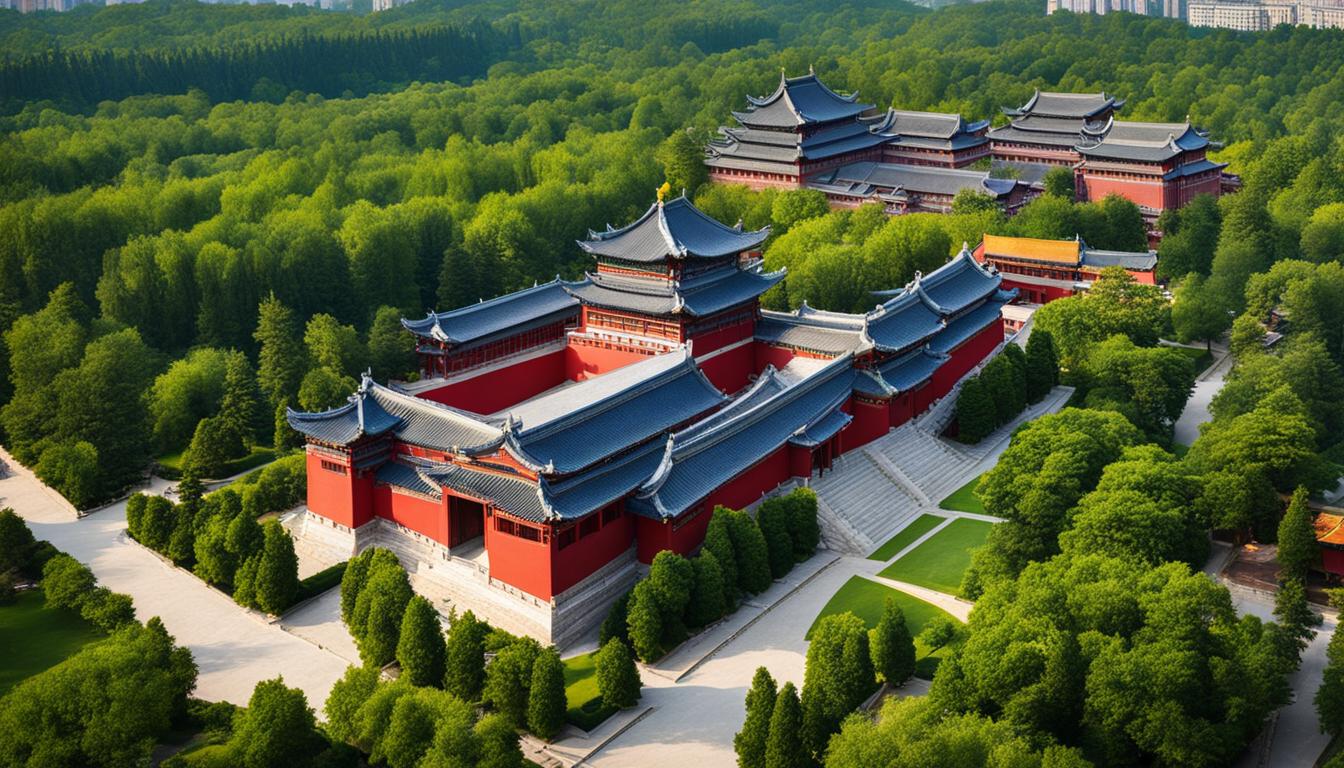Peking University, located in Beijing, China, is known as one of the top universities in Mainland China. With a rich history and prestigious reputation, it is regarded as a leading educational institution in the country. Peking University is committed to providing higher education of the highest quality and is recognized for its academic excellence and research capabilities in various fields of study.
Established in 1898, Peking University has a long and illustrious history. It has consistently maintained its position as a top-tier university in China, attracting top students and scholars from around the world. The university’s main campus is located in the Haidian District of Beijing, offering a conducive environment for learning and research.
As a research institution, Peking University has made significant contributions to various disciplines and has gained global recognition for its accomplishments. The university is affiliated with the Ministry of Education of China and is part of the C9 League, which comprises elite universities in the country.
Peking University’s commitment to academic excellence, diverse faculties, and notable figures associated with the institution have solidified its position as a premier academic institution in China and have contributed to its global recognition.
Key Takeaways:
- Peking University is a prestigious university in China, known for its academic excellence and research capabilities.
- The university has a rich history and is affiliated with the Ministry of Education of China.
- Peking University is part of the C9 League, a group of elite universities in China.
- The university’s diverse faculties and research entities offer a wide range of academic programs and research opportunities.
- Peking University has gained global recognition and attracts top students and scholars from around the world.
A Rich History and Prestigious Reputation
Peking University has a long and illustrious history. It was originally established as the Imperial University of Peking in 1898 by a royal charter from the Guangxu Emperor. As the second oldest university in China after Tianjin University, Peking University has played a significant role in shaping the country’s educational landscape.
In 1912, it underwent a name change and became Peking University, following the government’s order after the establishment of the Republic of China. Throughout its history, Peking University has witnessed several transformative events, including mergers with other educational institutions, such as Yenching University. It has consistently strived for excellence in education, research, and innovation, making it a premier academic institution in China and beyond.
“Peking University has a rich history that spans over a century. Its evolution from the Imperial University of Peking to its present-day status as a renowned academic institution reflects its enduring commitment to providing exceptional education and fostering intellectual growth.”
| Year | Event |
|---|---|
| 1898 | Establishment of the Imperial University of Peking |
| 1912 | Name change to Peking University |
| 1920 | Merged with Yenching University |
| 1952 | Underwent restructuring during the early years of the People’s Republic of China |
| 1978 | Reestablishment of a modern university system |
The rich history of Peking University underscores its contribution to China’s academic landscape and its continuous pursuit of excellence. From its humble beginnings as the Imperial University of Peking to its current status as a prestigious institution, Peking University remains dedicated to providing quality education and fostering innovation in the pursuit of knowledge.
Diverse Faculties and Research Entities
Peking University offers a wide range of academic programs and research opportunities through its diverse faculties and research entities. These faculties specialize in different fields of study, ensuring a comprehensive educational experience for students. The faculties at Peking University include:
- Humanities
- Social Sciences
- Economics and Management
- Science
- Information Technology and Engineering
- Health Science
Within these faculties, there are 55 schools and departments that cater to specific disciplines and areas of expertise. These schools and departments provide students with the necessary knowledge and skills to excel in their chosen fields.
Peking University is also home to 60 research entities where scholars conduct cutting-edge research in various disciplines. These research entities contribute to the advancement of knowledge and drive innovation in fields such as technology, medicine, social sciences, and more.
In addition, Peking University has ten affiliated hospitals, making significant contributions to health science and medical research. These hospitals provide valuable opportunities for students and researchers to engage in hands-on learning and contribute to advancements in healthcare.
The diverse faculties, research entities, and affiliated hospitals at Peking University create a vibrant and intellectually stimulating environment for students and faculty members. Through interdisciplinary collaboration and innovative research, Peking University continues to push the boundaries of knowledge and make significant contributions to various fields of study.
Notable Figures and Global Recognition
Peking University has been the educational institution of choice for many prominent figures who have made significant contributions to various fields. Renowned scholars, writers, politicians, and influential individuals have studied or worked at this prestigious institution, shaping its history and contributing to the development of modern China.
Some of the notable figures associated with Peking University include:
- Mao Zedong
- Lu Xun
- Gu Hongming
- Hu Shi
- Mao Dun
- Li Dazhao
- Chen Duxiu
- Premier Li Keqiang
These individuals are just a few examples of the influential alumni and faculty members who have left a lasting impact on Peking University and Chinese society as a whole.
Peking University’s commitment to excellence in education and research has earned it global recognition. The university boasts 76 academicians of the Chinese Academy of Sciences, 19 members of the Chinese Academy of Engineering, and 25 members of the World Academy of Sciences among its esteemed faculty. These affiliations further solidify Peking University’s position as a leading educational institution.

Conclusion
Peking University, China’s premier academic institution, is widely recognized as the top university in China. Renowned for its academic excellence and research prowess, Peking University has solidified its position as a leading educational institution.
With a rich history and prestigious reputation dating back to its establishment in 1898, Peking University has consistently nurtured generations of talented individuals who have made significant contributions to various fields of study. Notable figures such as Mao Zedong, Lu Xun, and Gu Hongming have walked its hallowed halls, leaving an indelible mark on China’s history and culture.
Home to diverse faculties spanning humanities, social sciences, economics and management, science, information technology and engineering, as well as health science, Peking University offers students and scholars a wide range of academic programs and research opportunities. Its research entities and affiliated hospitals further contribute to the university’s global recognition and foster an environment of innovation and knowledge creation.
As Peking University continues to attract top talent from around the world, its position as a premier academic institution remains unchallenged. Through its commitment to academic excellence, research prowess, and notable figures, Peking University continues to shape the future, making significant contributions to the advancement of knowledge and society.
FAQ
What is the history of Peking University?
Peking University was established in 1898 as the Imperial University of Peking by a royal charter from the Guangxu Emperor. It underwent a name change in 1912 and became Peking University, following the establishment of the Republic of China.
What faculties and departments does Peking University have?
Peking University is comprised of six faculties specializing in humanities, social sciences, economics and management, science, information technology and engineering, and health science. Within these faculties, there are 55 schools and departments that offer a wide range of academic programs and research opportunities.
What research opportunities are available at Peking University?
Peking University has 60 research entities where scholars conduct cutting-edge research in various disciplines. Additionally, the university has ten affiliated hospitals, further enhancing its contributions to health science and medical research.
Who are some notable figures associated with Peking University?
Peking University has a long list of notable figures, including Mao Zedong, Lu Xun, Gu Hongming, Hu Shi, Mao Dun, Li Dazhao, Chen Duxiu, and Premier Li Keqiang. These individuals have made significant contributions to various fields and have shaped both the university’s history and the development of modern China.
What is the global recognition of Peking University?
Peking University has 76 academicians of the Chinese Academy of Sciences, 19 members of the Chinese Academy of Engineering, and 25 members of the World Academy of Sciences among its faculty. This global recognition solidifies its reputation as a leading educational institution.

